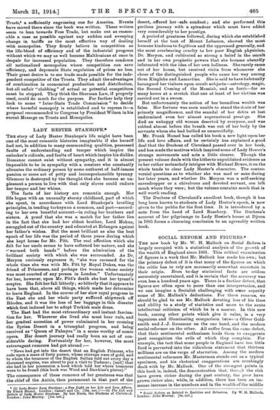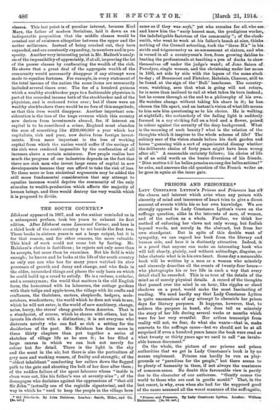SOCIAL REFORM AND FIGURES.*
THE new book by Mr. W. H. Mallock on Social Reform is largely occupied with a statistical analysis of the growth of the wealth of England since 1801 This critical examination of figures is a work that Mr. Matlock has made his own; but the primary defect of it is that many of the figures on which the critic has to rely are necessarily somewhat uncertain in their origin. Even to-day statistical facts are seldom accurately ascertained, and it is certain that the accuracy was even less a hundred years ago. There is a further defect, that figures are often open to more than one interpretation, and we can imagine a Socialiiit challenging with some asperity some of Mr. Mallock's deductions. For these reasons, we should be glad to see Mr. Mallock devoting less of his time and ability to a study of statistics and more to the acute intellectual criticism of which he is a master. In this new book, among other points which give it value, is a very ingenious and illuminating comparison between Oliver Gold- smith and J.-J. Rousseau on the one band, and the modern social reformer on the other. All suffer from the same defect, that their sentimental enthusiasm leads them to exaggerate past recognition the evils of which they complain. For example, the fact that some people in England have too little food is perverted into the ridiculous statement that thirteen millions are on the verge of starvation. Among the modern sentimental reformers Mr. Maaterman stands out as a typical specimen, and his rhetorical exaggerations are crushingly dealt with by Mr. Mallock. One of the strongest points in this book is, indeed, the demonstration that, though the rich have grown richer during the past century, the poor have grown richer also; while, in addition, there has been an im- mense increase in the numbers and in the wealth of the middle • Social Reform as Related to Realities and Delusions. fly W. H. Mallochs London: John Murray. [Gs. net.]
°lessee. This last point is of peculiar interest, because Karl Marx, the father of modern Socialism, laid it down as an indisputable proposition that the middle classes would be crushed out of existence altogether between the upper and the nether millstones. Instead of being crushed out, they have expanded, and are constantly expanding, in numbers and in pro- sperity. Another very interesting point is Mr. Mallock's manly- sie of the impossibility of appreciably, if at all, improving the lot of the poorer classes by confiscating the wealth of the rich. He shows that a great deal of the aggregate wealth of the community- would necessarily disappear if any attempt were made to equalize fortunes. For example, in every statement of the total income of the nation the same items are necessarily included several times over. The fee of a hundred guineas which a wealthy stockbroker. pays to a fashionable physician is partof the recorded income both of the stockbroker and of the physician, and is reckoned twice over ; but if there were no wealthy stockbrokers there would be-no fees of this magnitude, so that this item would disappear. Another important con- sideration is the loss of the huge revenue which this country now derives from investments abroad, for, if interest on capital is to be considered a crime, England must abandon the sum of something like 2200,000,000 a year which her capitalists, rich and poor, now derive from foreign invest- ments. Even more important is the loss of working capital from which the nation would suffer if the savings of the rich were rendered impossible by the confiscation of all incomes above a certain minimum. Few people realize Low much the progress of our industries depends on the fact that there are -rich men who invest large sums of capital in new developments because they can afford to take the risk of loss. To these more or less statistical arguments may be added the still mope fundamental consideration that any attempt to equalize incomes would deprive the community of the only stimulus to wealth-production which affects the majority of human beings, and thaw would destroy the very wealth which it is proposed to divide.











































 Previous page
Previous page